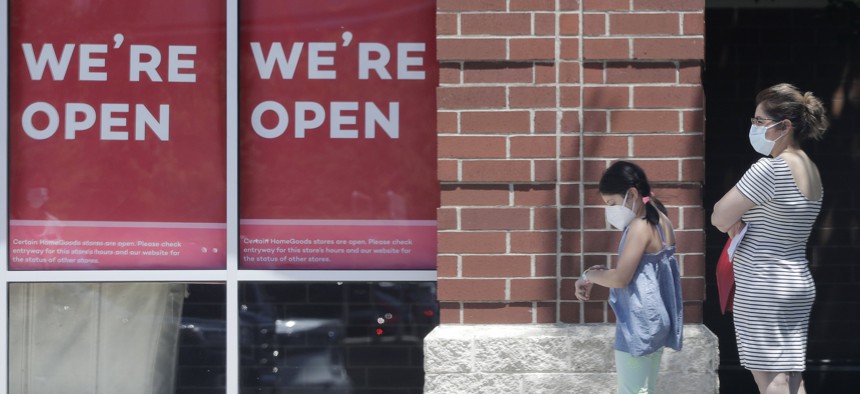Face Masks ‘Significantly Reduce’ Spread of Covid-19, Study Finds

People wear face masks as they line up to enter a retail store in Schaumburg, Ill., Thursday, June 11, 2020. AP Photo/Nam Y. Huh

Connecting state and local government leaders
“The effect is greatest when 100% of the public wear face masks,” researchers wrote, suggesting that officials should encourage people to cover their faces in public.
The widespread use of face masks by the public could significantly slow the spread of the coronavirus, prevent recurring waves of outbreaks and allow for less stringent restrictions on economic activity and other facets of daily life, according to new academic research.
Researchers at the universities of Cambridge and Greenwich in the U.K. used two mathematical models to examine the possible benefits of face masks in taming the virus. Here in the U.S., Covid-19, the highly contagious respiratory illness that the virus causes, has now claimed upwards of 113,000 lives and has driven the nation into a recession.
“Both of our models show that, under a wide range of plausible parameter conditions, face mask use by the public could significantly reduce the rate of COVID-19 spread, prevent further disease waves and allow less stringent lock-down regimes,” the researchers wrote.
“The effect is greatest when 100% of the public wear face masks. It follows that the adoption of this simple technology ought to be re-evaluated in countries where face mask use is not being encouraged,” they added in a paper published this week by the journal Proceedings of the Royal Society A.
The researchers also found that a combination of both face mask wearing and “lock-down periods,” where people limit travel and commerce is restricted, is likely a better solution to managing the pandemic than either of those strategies on its own. And, in summary, they say their “modeling analyses provide support for the immediate, universal adoption of face masks by the public.”
One of the problems with the virus is that people who have it may not always show clear symptoms, raising the risk they will spread it unknowingly.
But recommendations around the use of masks have changed over the course of the outbreak and remain inconsistent across the U.S.
At the very beginning of the pandemic, federal public health officials said people shouldn’t wear masks.
There have also been concerns about mask shortages for medical personnel and first responders, and experts have warned that people might use masks improperly and actually increase their own chances of getting the virus by fiddling with them, or touching their faces more.
The U.K. researchers suggest even homemade masks can be effective and also that face mask use has “population-level benefits” even in circumstances where wearers face increased risks.
Here in the U.S., the CDC now recommends wearing cloth face coverings in public settings, like supermarkets and other retail stores, where it’s difficult for people to maintain a safe distance of about six feet between one another.
Despite this recommendation, guidelines for face coverings, and personal decisions about whether or not to wear masks when out in public, have taken on political undertones. And requirements put in place by some businesses have led to arguments and more serious confrontations between store employees trying to uphold the rules and disgruntled patrons.
For some, masks are a minor inconvenience that can help to protect public health. For others, they’re seen as an excessive precaution and a symbol of government overreach.
Orange County, California officials this week walked back a requirement that people wear masks when in public places where they couldn’t keep at least six feet apart, but said that face coverings are still strongly recommended.
The county’s stricter mask policy led to a public backlash, with a county health officer, Nichole Quick, receiving threats and later resigning. A top Orange County public health official emphasized this week that the latest policy change was not spurred by public pushback.
Elsewhere around the U.S. states and localities have a variety of mask guidelines in place.
In Washington state, a requirement went into effect this week for all employees to wear a cloth face covering, except when working alone, or if their job involves no in-person interaction.
Illinois says people should wear masks or other face coverings when leaving their home, or going to work if they cannot keep six feet of distance from others.
San Francisco requires that people wear face coverings when they are within six feet from people who they don’t live with. People are restricted from entering businesses and public transit without them.
In Missouri this week, the Springfield-Greene County Health Department concluded that none of the 140 clients or six employees at a local hair salon appear to have come down with coronavirus, even though they were potentially exposed to two stylists who tested positive.
They noted that the salon had mask requirements, distancing practices and a system for staggered appointments in place. “This is exciting news about the value of masking to prevent COVID-19,” said director of health Clay Goddard.
The county is further studying the incident, he added, “including what types of face coverings were worn and what other precautions were taken to lead to this encouraging result.”
A copy of the research on masks can be found here.
Bill Lucia is a senior reporter for Route Fifty and is based Olympia, Washington.

NEXT STORY: Is It Time to Create a National Registry of Police Misconduct?





